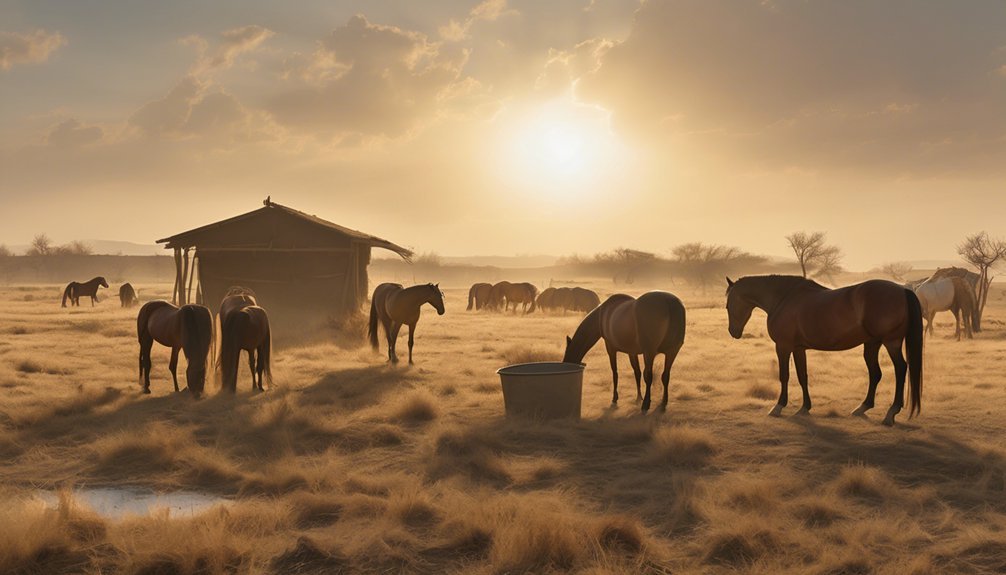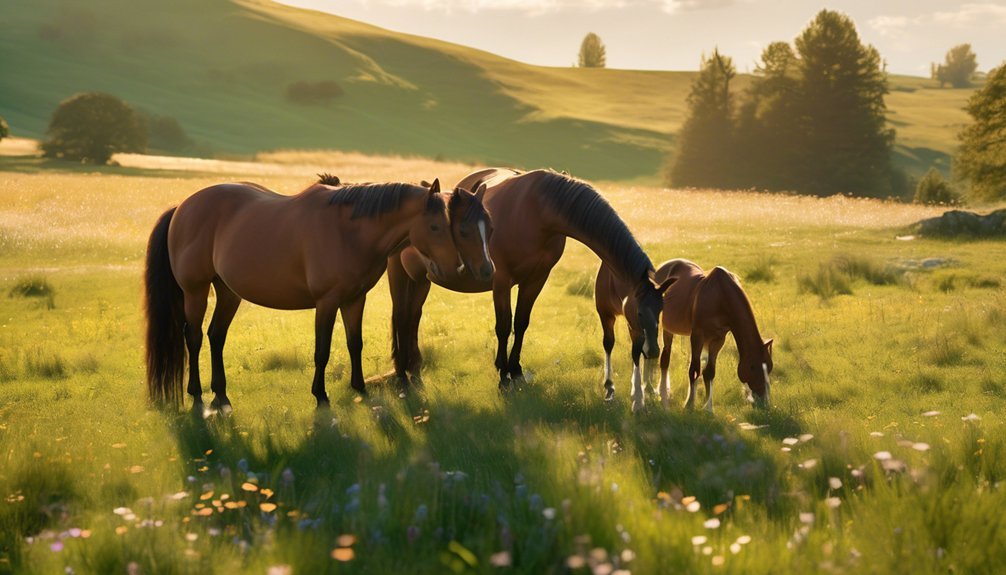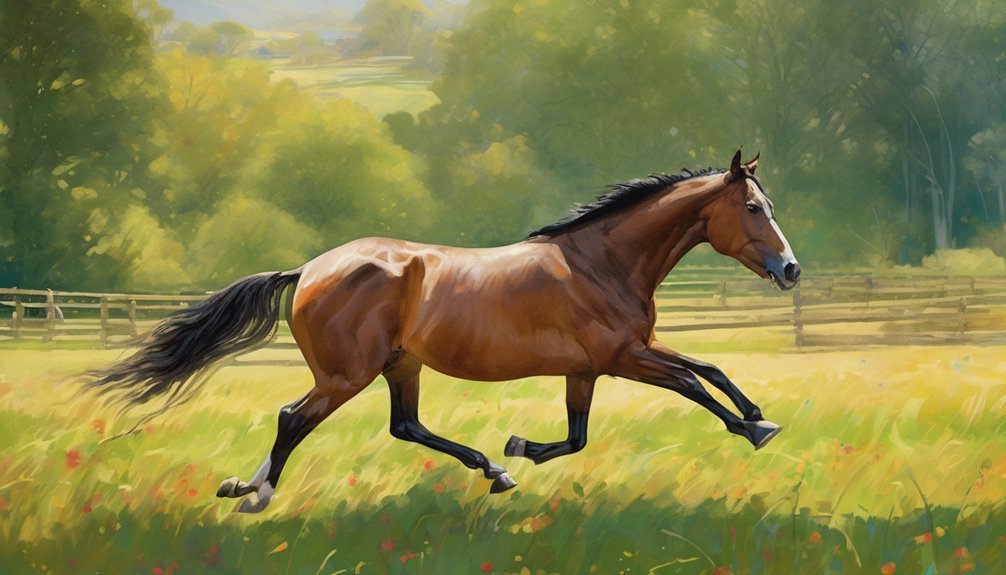
Your horse's diet plays a crucial role in its overall behavior and performance. A balanced nutrition plan can prevent irritability and lethargy, while poor feeding choices may lead to hyperactivity or apathy. Understanding the right types of forage, essential nutrients, and the impact of grain can significantly influence your horse's mood and energy levels. This analysis uncovers how dietary adjustments can transform your horse's performance, prompting a closer look at common mistakes owners make.
Key Takeaways
- A balanced diet prevents behavioral issues, reducing irritability and lethargy in horses.
- Quality forage enhances digestion and gut health, promoting overall well-being and performance.
- Nutrient deficiencies, particularly in vitamins and minerals, can negatively affect mood and energy levels.
- Consistent feeding times and environments minimize anxiety, supporting stable behavior and performance.
- Specific supplements, like probiotics and calming agents, can improve gut health and reduce anxiety during training.
Understanding Equine Nutrition

When you consider how diet influences horse behavior, it's essential to grasp the fundamentals of equine nutrition. Horses require a balanced diet that meets their specific needs, as nutritional deficiencies can lead to behavioral issues, such as irritability or lethargy.
Understanding the various feed types—like grains, concentrates, and supplements—helps you make informed decisions. Each type offers different nutrient profiles, impacting your horse's energy levels and temperament. For instance, too much grain can lead to hyperactivity, while a lack of essential vitamins may result in apathy.
The Role of Forage in a Horse's Diet
Forage plays a crucial role in a horse's diet, as it provides essential nutrients and promotes healthy digestion. The types of forage you choose—like grass or hay—can significantly influence your horse's overall well-being.
Quality matters; high-quality forage enhances forage intake, ensuring your horse gets the necessary fiber. Proper forage digestion is vital for maintaining gut health, which directly impacts behavior and performance.
Additionally, the benefits of incorporating diverse forage types can't be overstated; they offer different nutrients and stimulate natural foraging behaviors. Effective forage management, including regular assessments of forage quality, helps you optimize your horse's diet.
Essential Nutrients for Optimal Performance
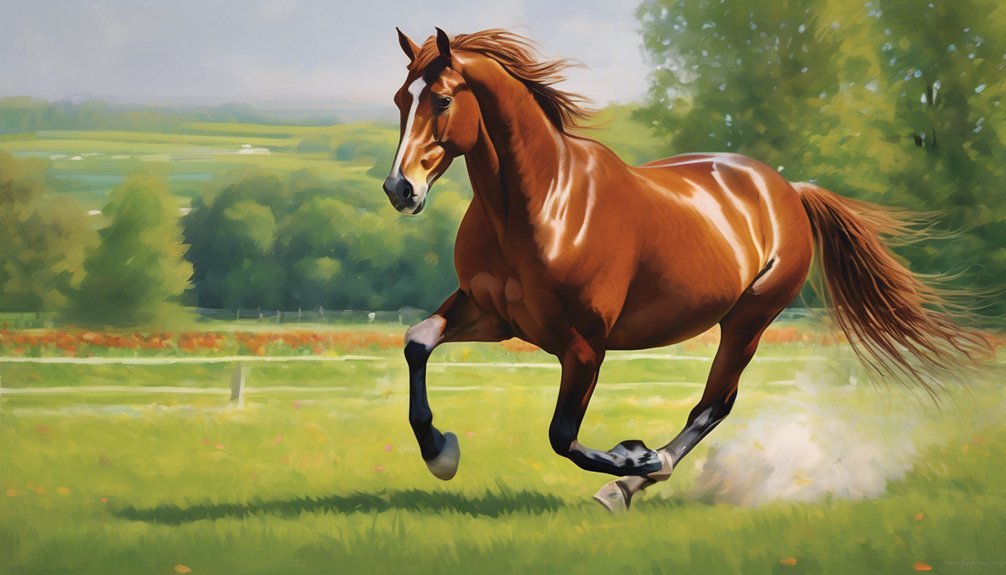
The nutrients your horse receives from its diet directly impact its performance and overall health. To ensure optimal performance, focus on these essential nutrients:
- Protein Sources: Quality protein supports muscle development and repair.
- Vitamin Balance: Vitamins play key roles in metabolic processes and immune function.
- Mineral Intake: Essential minerals, like calcium and phosphorus, are crucial for bone health and muscle function.
- Carbohydrate Types: Different carbohydrate types affect energy release; choose those that provide sustained energy.
Additionally, consider fat content for calorie density, fiber importance for digestive health, and electrolyte needs, especially during intense workouts.
Nutrient timing can also enhance energy balance, ensuring your horse remains fit and ready for performance. Prioritizing these factors can lead to a happier and healthier equine partner.
The Effects of Grain on Energy Levels
Grain can significantly influence your horse's energy levels, especially when it comes to performance and endurance. Different grain types can lead to varying energy spikes, impacting your horse's ability to reach performance peaks.
If you feed your horse too much grain too quickly, you might notice digestive health issues or behavioral changes due to fluctuating energy levels. Establishing consistent feeding schedules can help manage these energy spikes effectively.
Consider grain alternatives like beet pulp or oats, which may provide more stable energy without the risk of dramatic ups and downs.
How Diet Influences Mood and Behavior

While many horse owners focus primarily on energy levels, diet also plays a crucial role in shaping a horse's mood and overall behavior. A horse's feeding routines can directly influence mood swings and behavioral changes.
Here are key factors to consider:
- Digestive Health: A balanced diet promotes gut health, reducing stress responses.
- Environmental Factors: A calm feeding area minimizes anxiety during meals.
- Social Interactions: Horses thrive in companionship; a communal feeding routine can enhance mood.
- Training Consistency: Regular feeding times support stable energy levels, aiding consistent behavior.
The Importance of Hydration
Hydration significantly affects a horse's behavior and overall well-being, often being overlooked in discussions about diet. When you prioritize hydration, you enhance your horse's performance and mood.
Implementing effective hydration strategies—like ensuring access to fresh, clean water and adding electrolytes during hot weather—can make a noticeable difference. Regular hydration monitoring is crucial; observing your horse's water intake and checking for signs of dehydration can help you catch any issues early.
Supplements: Do They Make a Difference?
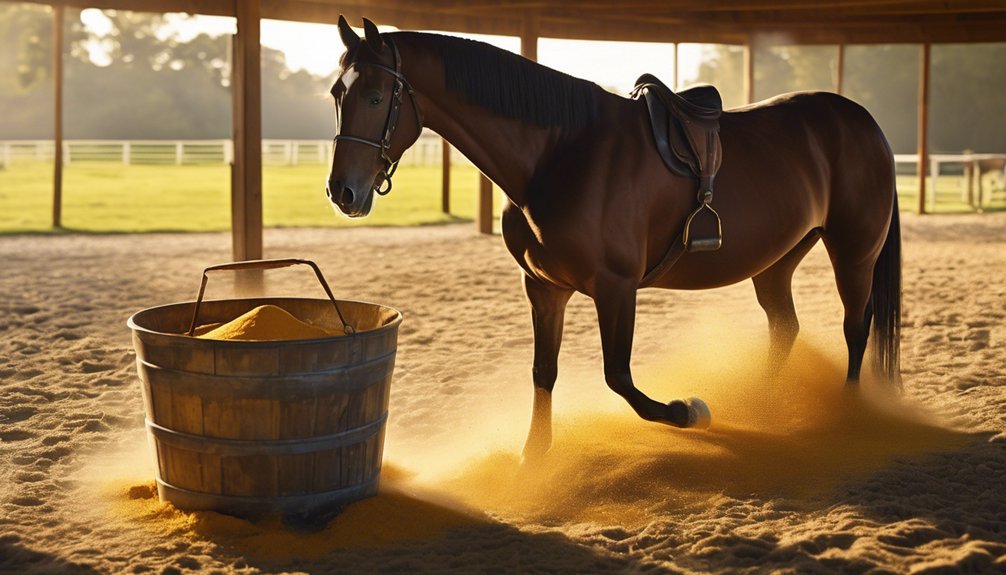
How do supplements truly impact horse behavior and health? The right supplement types can enhance your horse's overall well-being and performance benefits.
Here are four key areas where supplements can make a difference:
- Joint Health: Glucosamine and chondroitin sulfate support joint function and mobility.
- Digestive Aid: Probiotics and prebiotics promote gut health, leading to improved nutrient absorption.
- Calming Agents: Ingredients like magnesium can help reduce anxiety and improve focus during training.
- Muscle Recovery: Amino acids and electrolytes aid in faster recovery post-exercise.
When you carefully select supplements based on your horse's needs, you're investing in their health and performance.
The Connection Between Diet and Training
The link between diet and training performance in horses is significant and often underestimated. You need to recognize that dietary adjustments can directly influence your horse's energy levels, focus, and overall responsiveness during training sessions.
For instance, aligning your horse's nutrition with its training schedule ensures that it receives the right balance of carbohydrates, fats, and proteins at crucial times. This proactive approach not only enhances stamina but also supports muscle recovery, allowing your horse to perform better over time.
When you pay close attention to what your horse eats, you're setting it up for success in both training and competition. By prioritizing their diet, you can create a more effective training environment tailored to your horse's unique needs and goals.
Common Dietary Mistakes to Avoid
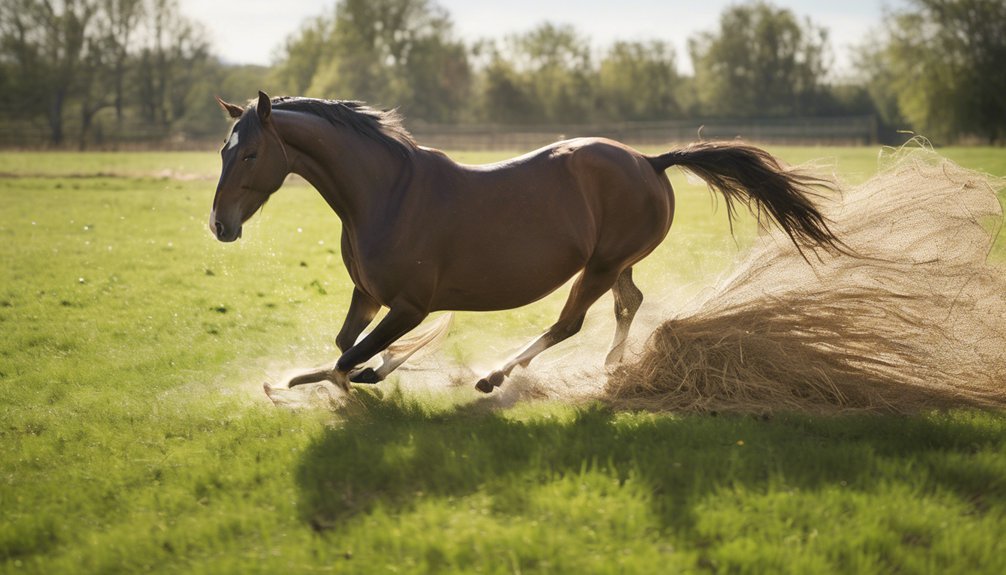
While many horse owners focus on the quality of hay and grain, neglecting important dietary aspects can lead to significant behavioral issues and health problems.
To optimize your horse's diet, avoid these common mistakes:
- Ignoring caloric balance: Ensure your horse's caloric intake matches its energy expenditure for proper weight management.
- Inconsistent feeding schedule: Stick to a regular feeding routine to promote digestive health and stable behavior.
- Poor nutrient timing: Timing of feed can affect energy levels; consider when your horse works or competes.
- Overlooking forage quality: High-quality forage is essential; it supports gut health and reduces behavioral issues.
Tailoring Diets for Individual Needs
To optimize your horse's behavior and overall well-being, it's crucial to tailor their diet to meet individual needs. Individualized feeding ensures that each horse receives the right balance of nutrients to support their unique lifestyle, age, and health status. Nutrient balancing is key to preventing behavioral issues linked to dietary deficiencies or excesses.
Here's a quick reference to help you understand how different factors influence your horse's dietary needs:
| Factor | Dietary Considerations |
|---|---|
| Age | Young horses need higher energy |
| Activity Level | Performance horses require more |
| Health Conditions | Special diets for metabolic issues |
| Body Condition Score | Adjust feed to maintain ideal weight |
Frequently Asked Questions
Can Certain Diets Help With Specific Behavioral Issues in Horses?
Certain diets can indeed help with specific behavioral issues in horses. By making dietary adjustments, you can address behavioral triggers, ultimately promoting a calmer demeanor and improving your horse's overall well-being and performance.
How Does a Horse's Age Affect Its Dietary Needs?
As a horse ages, its dietary demands dramatically differ. Foal nutrition focuses on growth, while a senior diet emphasizes joint health and digestion. Tailoring their feed ensures optimal well-being throughout each life stage.
Are There Any Foods That Are Toxic to Horses?
Yes, certain toxic plants like ragwort and harmful grains such as corn can seriously endanger your horse's health. It's crucial you identify and avoid these risks to ensure your horse stays safe and thriving.
How Often Should I Change My Horse's Diet?
Think of your horse's diet as a flowing river, requiring steady care. You should transition diets gradually, ideally every few months, while maintaining consistent feeding frequency. This approach helps ensure your horse thrives and feels balanced.
What Impact Does Seasonal Change Have on a Horse's Diet?
Seasonal changes significantly affect your horse's diet. As temperatures fluctuate, you'll notice variations in seasonal forage availability and nutritional content. Adapting their diet ensures optimal health and performance throughout the year, keeping them energized and thriving.
Conclusion
In understanding your horse's diet, you're not just feeding an animal; you're nurturing a partner in performance. A well-balanced diet can turn a restless horse into a focused athlete, highlighting the profound connection between nutrition and behavior. By avoiding common dietary pitfalls and tailoring nutrition to individual needs, you empower your horse to thrive. Ultimately, the right diet isn't just about sustenance—it's the foundation for a harmonious relationship and peak performance in every stride.



